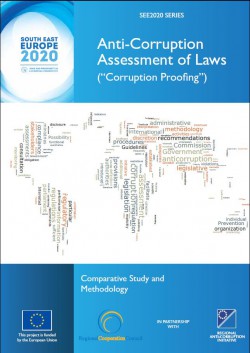Anti Corruption Assessment of Laws
Many corruption risks can appear along the legislative process and sometimes new legislative solutions can open door for corruption. For example, a procedure for licensing businesses might be complicated and vague, and as a result motivate citizens applying for such a license to resort to speed payments and the civil servants providing the license to ask for bribes. Anti-corruption assessment of legislation is a review of the form and substance of drafted or enacted legal rules in order to detect and minimize the risk of future corruption that the rules could facilitate.
The Regional Anti-corruption Initiative (RAI) has dedicated efforts to this corruption preventive measure. Supported by the Regional Cooperation Council, RAI produced a Comparative Study and Methodology describing the current state of play within the Regional Anti Corruption Initiative member countries in the area of corruption proofing of legislation, but which also looks beyond the region.
On 13 – 14 November, 2014, the Regional Anti-corruption Initiative (RAI), the Regional Cooperation Council (RCC), the Ministry of State on Local Issues of Albania and the Southeast Leadership for Development and Integrity (SELDI) co-organized the Regional Conference on Good Governance and Anti-corruption Policy Challenges. The Conference recommended for use the Methodology on Anti-corruption Risk Assessment of Laws, adopted the 10 Ten Principles of Effective Corruption Proofing as an international standard in this field and recommended corruption risk assessment as a corruption preventive tool. For more information, please see Recommendations of the Regional Conference Preventing Corruption by Assessing Its Risks.
Building up on the findings of the Study and Methodology mentioned above, RAI is emphasizing the importance of Corruption Proofing of Legislation as a new preventative tool that the states’ administrations can use and thus prevent the possibility for corruptive practices to build up later during the implementation of the new laws.
To this end, RAI Secretariat, in cooperation with the UNODC, developed Southeast Europe Regional Programme on Strengthening the Capacity of Anti-corruption Authorities and Civil Society to Combat Corruption and Contribute to the UNCAC Review Process. The Programme is funded by the Austrian Development Agency.
Outcome 2 of the Regional Programme is dedicated to building capacities of the public authorities in South East Europe in conducting anti-corruption assessment of laws (corruption proofing of legislation). RAI Secretariat will provide support in establishing national methodologies by assessing current legislation and/or existing methodologies and providing recommendations for improvement. The relevant public authorities, along with the non-governmental organisations will be trained in applying the national methodologies on anti-corruption assessment of laws, and a software to facilitate corruption proofing will be developed and adjusted to national authorities’ needs.
See below the already available Country Assessment Reports:
Serbia: Assessment Report on Corruption Proofing
Macedonia: Assessment Report on Corruption Proofing
Albania: Assessment Report on Corruption Proofing
Bosnia and Herzegovina: Assessment Report on Corruption Proofing & Bosnia and Herzegovina: Assessment Report on Corruption Proofing of Legislation – Local Language
Moldova: Assessment report on Corruption Proofing
Kosovo*: Assessment report on Corruption Proofing, including translation of the report
In April 2017 RAI Secretariat produced a Montenegro: Assessment Report on Corruption Proofing. The report is available in English language only at the moment and translation to local langauge is underway.
* This designation is without prejudice to positions on status, and is in line with UNSCR 1244/1999 and the ICJ Opinion on the Kosovo declaration of independence.
Updated February 2017
Part 2 of the Corruption Proofing Publication – the Methodology, is translated into the local language (B/H/S).
The publication is the result of research conducted between June and August 2014 under the guidance of the Secretariat of the Regional Anti-corruption Initiative. The research used information on ‘corruption proofing’ that was available online in English, French, Russian and Spanish; in addition, it used selected print sources. The author drafted several country chapters (Part 1) and the methodology (Part 2). He submitted the international country chapters to at least one relevant stakeholder in each country (anti-corruption agency or specialized civil society group) for further input. Several countries provided feedback on the country chapters. The country chapters from the region as well as the methodology were also subject to review by a regional workshop held in Montenegro in September 2014.
Corruption Proofing Publication – the Methodology in B/H/S Languages Unofficial Translation
Corruption Proofing Publication – the Methodology in Bulgarian Language Unofficial Translation
Corruption Proofing Publication – the Methodology in Romanian Language Unofficial Translation
Corruption Proofing Publication – the Methodology in Macedonian Language Unofficial Translation
Corruption Proofing Publication – the Methodology in Albanian Language Unofficial Translation

